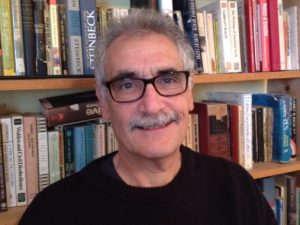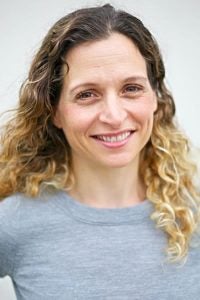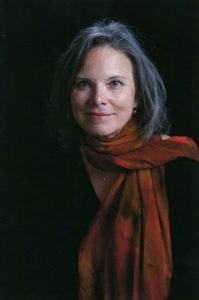The Watchword Prize
About the Contest:
At the Center on Privacy & Technology, we work to protect the privacy rights of all people, and to build the capacity of communities to resist mass surveillance. While we focus on pushing for change through law and policy, we know the power of art to illuminate, transform and move to action. Artists and poets have a deeply-rooted tradition of participation in movements for social change, and we want to help foster and inspire the production of new works of art that evoke and critique experiences and practices of surveillance.
To that end, the Center on Privacy & Technology launched The Watchword Prize, a new poetry contest to provoke work on the theme of surveillance – speaking to the experience of watching or being placed under watch, the different lenses through which one sees and is seen by others, in both the intimate and public spheres of our lives.
Winning poem and runner-up:
After combing through the many submissions, we are thrilled to announce the winning poem for the inaugural Watchword Prize is “Watchman, What of the Night?” by Michael Colonnese.
Submissions were judged by acclaimed “poet of witness” and Georgetown University faculty member Carolyn Forché who had this to say about the winning poem.
“Watchman, What Of The Night,” is a searing lyric-narrative meditation on manual labor, boredom, isolation, and hunger for meaning. It begins in the shadows of the plating room and ends in the shadow of earth turning slowly toward the sun, a vision of hope artfully set within the realization of the damage inflicted by the endurance of the solitude that comes of drudgery and political estrangement. The poet’s precise diction, vivid imagery and mastery of tone is impressive, as is the poet’s deft ear for the music of inner life.
–
Watchman, What of the Night?
I remember making my way
through the shadows of the plating room,
inhaling the sweet-sour stench
of the acid-etch bath, and staring too long
at rows of black rubber gloves
that hung like severed hands
on wooden drying racks
where line workers had left them
after finishing their shift.
Hour after hour, night after night,
year after year, I yearned
for something more, always half-expecting
the totally destructive,
a meteor strike or a nuclear war,
but nothing much happened
although sometimes huge rats
would leap from the scrap drums
where they’d been attempting to digest
wet strands of steel wire,
and I’d shudder and curse,
despising my own hungers.
Between rounds, I’d try revising
my poems or else listen
to the radio, to the oldies station
or some phone-in talk show,
but the callers seldom had
a political opinion
that wasn’t sentimental or insane.
Working in solitude
was damaging me in ways
I didn’t understand then
although I kept trying to imagine
the entire planet in shadow
but turning slowly towards the sun.
About Michael Colonnese
Michael Colonnese is the author of Sex and Death, I Suppose, which he describes as a hard-boiled detective novel with a soft Jungian underbelly, of a chapbook, Temporary Agency, and of a poetry collection, Double Feature. His short fiction, creative nonfiction, essays, and poems have appeared in over sixty literary magazines and academic journals, large and small. He’s a retired university professor, and for many decades he served as the managing editor of Longleaf Press, a literary nonprofit. He currently lives in the mountains of western North Carolina, near Asheville.
–
Among the many finalists, Carolyn also selected a runner-up entry, “Vigil” by Eleanor Stanford.
Vigil
My son says the government can manufacture
rain. Can read the secrets in his brain. My son works
in June’s yard, among her wilting peonies. June teaches him
the names of what she calls “the undesirables.”
Purslane and lesser celandine.
The first time the spirits came for him, my son
was three. He flailed and screamed and clung to me. Fátima
peeled him from my body, whisper-sung to him
in Portuguese. Does God’s pleasure consist in secrecy?
On the sidewalk, I make a limp pile of undesireables,
Crouch between the gladiolus and the grass, listen
to Ram Dass telling me desire is a trap and
the body is gross. Telling me the guru subsists on
a single glass of milk a day. Since my lover has returned
to Istanbul, I am trying to convert
my sexual energy into something finer—silk
or breath or glowing text. The guru eats arsenic
and LSD, stays upright and unmoved as milkweed.
The second time the spirits came, my son knew
he could not resist. Seventeen years ago,
he left my body. Starless, dark with milk.
Does God’s pleasure consist
in alchemy? On the porch of the old
stone house in Germantown, June
holds her fiddle atilt.
About Eleanor Stanford

Eleanor Stanford is the author of four books of poems, including most recently Blue Yodel, forthcoming in 2024 from CarnegieMellon University Press. Her work has appeared in Poetry, Ploughshares, The Harvard Review, The Iowa Review, and many others. She was a Fulbright Scholar to Brazil, and the recipient of a 2019 NEA grant in poetry. She lives in the Philadelphia area.
–
About the Judge:

Carolyn Forché is an American poet, memoirist, translator, editor, teacher and human rights advocate whose work spans five decades, elaborating universal themes of private and collective human struggle for our specific historical moment. She is the author of five poetry collections, including most recently In the Lateness of the World: Poems (Penguin, 2020), and the editor of two anthologies featuring “the poetry of witness,” a term she coined to describe the expressive practice of poets writing about, and from within, extreme social and political conditions such as war, incarceration and enslavement. Her memoir, What You Have Heard Is True (Penguin Random House, 2019), tells the story of her time in El Salvador and the impact of her experiences there on her life and writing. Forché has received numerous awards for her work, including a Guggenheim Foundation fellowship, the Hiroshima Foundation Award for Peace and Culture, the Lannan Award in Poetry, and the Academy of American Poets Fellowship for distinguished poetic achievement. In 2023, Forché was inducted into the American Academy of Arts & Sciences. Forché currently serves as Director of Readings and Talks at the Lannan Center for Poetry and Social Practice and is a University Professor of English at Georgetown University.
